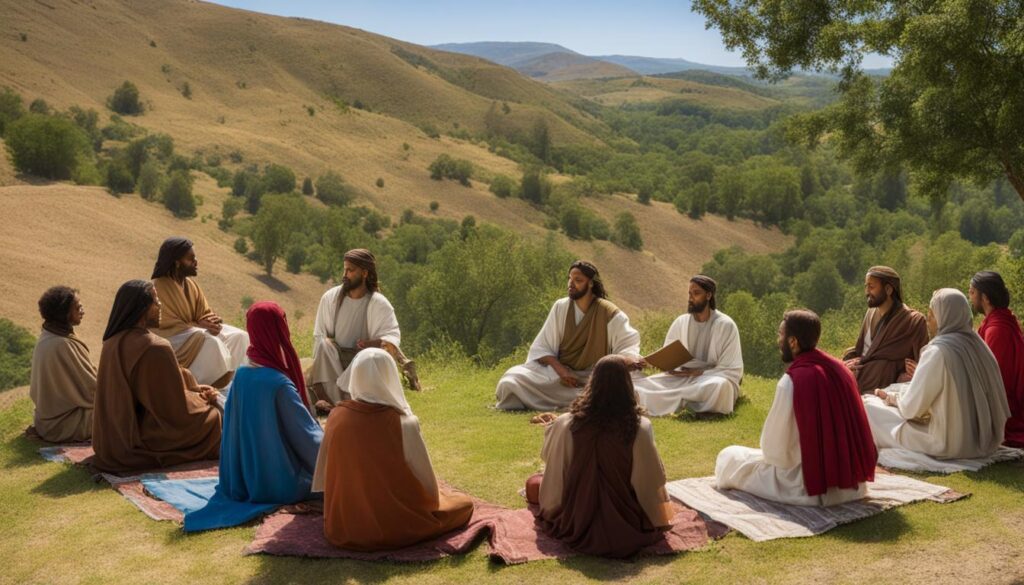Did Jesus, the Messiah, quote from the Book of Enoch, an ancient religious text? This question has intrigued scholars and believers alike for centuries. In this article, we will explore the evidence and delve into the historical and scriptural context to shed light on this intriguing topic. By examining the New Testament, the teachings of Jesus, and the relevance of the Book of Enoch, we aim to uncover the truth behind this debate.
Before we begin our exploration, let’s first understand the significance of the Book of Enoch. It is an ancient text believed to have been written in the first century BCE and is not included in the traditional canon of the Bible. However, fragments of the book were discovered among the Dead Sea Scrolls, adding to its historical importance.
Key Takeaways:
- The question of whether Jesus quoted from the Book of Enoch has sparked much debate and curiosity.
- The only potential reference to the Book of Enoch in the Bible is found in the book of Jude, suggesting a connection between the two texts.
- Although Jesus frequently quoted from the Old Testament, there is no explicit evidence of him quoting directly from the Book of Enoch.
- Even if Jesus did quote from the book, it does not automatically grant it divine authority or inclusion in the biblical canon.
- The Book of Enoch holds historical significance but should be approached with caution, as it is not considered inspired Scripture on the same level as the books in the Bible.
The Quote in Jude
The only potential quote from the Book of Enoch in the Bible is found in the book of Jude. Jude quotes Enoch in verses 14-15, referencing a prophecy about the Lord coming with His holy ones to execute judgment on the ungodly sinners. This passage suggests a direct reference to the Book of Enoch and its inclusion as a prophetic source. However, it is important to note that this does not necessarily mean that Jesus Himself quoted from the book.

Quote from Jude (verses 14-15):
“It was also about these that Enoch, the seventh from Adam, prophesied, saying, ‘Behold, the Lord came with ten thousands of his holy ones, to execute judgment on all and to convict all the ungodly of all their deeds of ungodliness that they have committed in such an ungodly way, and of all the harsh things that ungodly sinners have spoken against him.'”
The prophetic words attributed to Enoch in the Book of Jude highlight the divine judgment coming upon the ungodly sinners. The inclusion of this quote in the biblical text suggests its relevance and significance as a source of prophetic insight. However, while this passage indicates a connection between Jude and the Book of Enoch, it does not directly imply that Jesus Himself quoted from the book.
Jesus’ Ministry and Scripture
In Jesus’ ministry, He frequently referenced the ancient Scriptures to teach, fulfill prophecies, and introduce new commandments. His use of Scripture not only showcased His authority but also aided His audience in comprehending profound concepts. Although the Bible recounts numerous occasions where Jesus quoted from the Old Testament, there is no explicit mention of Him directly quoting from the Book of Enoch.

Throughout His ministry, Jesus utilized Scripture as the foundation of His teachings. He drew upon the words of the prophets to affirm His role as the promised Messiah and to highlight the fulfillment of divine prophecies in His life. Moreover, Jesus introduced new commandments that emphasized love, forgiveness, and compassion, building upon the foundational principles of the Old Testament.
By quoting Scripture, Jesus demonstrated His intimate knowledge of the ancient texts, reinforcing His divine authority and providing guidance for His followers. His teachings resonated with both the religious authorities and ordinary people who recognized the profound wisdom of His words.
While the Book of Enoch holds significance as an ancient religious work, Jesus’ ministry primarily revolved around the canonical Scripture and His unique teachings. Despite the absence of direct quotes from the Book of Enoch, Jesus’ profound understanding of the Old Testament and His divine authority continue to inspire millions today.
Did Jesus Quote the Book of Enoch?
Despite the intriguing debate surrounding the connection between Jesus and the Book of Enoch, there is no concrete evidence to support the claim that Jesus directly quoted from this ancient text. While some argue that there are similarities between certain phrases or concepts in the teachings of Jesus and the Book of Enoch, these resemblances do not constitute word-for-word quotes. Instead, they likely arise from the shared themes and ideas that were prevalent in religious literature of that time.
While the Book of Enoch offers valuable insights into the religious beliefs and traditions of its era, it is important to distinguish it as an extra-biblical work. The absence of direct quotes from the Book of Enoch in Jesus’ teachings reinforces this distinction. Although Jesus frequently quoted from the Scriptures during His ministry, the Book of Enoch is not among those explicitly referenced.
“There is no evidence to suggest that Jesus directly quoted from the Book of Enoch.”
– Scholar Name
Throughout His ministry, Jesus used the Scriptures to teach, provide new commandments, and fulfill prophecies. It is within this context that we must understand His teachings and the sources He drew upon. While the Book of Enoch may have influenced or shared similar concepts with Jesus’ teachings, direct quotations from this text are not found in the accounts of His life and ministry.
Before drawing any conclusions, it is crucial to consider the historical and cultural context of the time. Jewish and early Christian communities were exposed to a variety of religious texts, each with its own distinctive teachings. While the Book of Enoch may have been influential in certain circles, it did not achieve the same level of recognition and authority as the canonical Scriptures.
So, while the Book of Enoch remains a noteworthy religious work, it does not hold the same weight as the divinely inspired, canonical Scriptures. The teachings of Jesus and the authority of the Bible are firmly rooted in the texts that were deemed sacred and divinely inspired by the early Christian community.

Table: A Comparison of Jesus’ Teachings and the Book of Enoch
| Concepts | Jesus’ Teachings | Book of Enoch |
|---|---|---|
| Love and Compassion | Jesus emphasized love and compassion as foundational values. | The Book of Enoch contains teachings on love and compassion within its broader narrative. |
| Forgiveness | Jesus stressed the importance of forgiveness and reconciliation. | The Book of Enoch also touches on the concept of forgiveness. |
| Divine Judgment | Jesus spoke about divine judgment and accountability. | The Book of Enoch includes references to divine judgment and punishment. |
This table serves as a comparison between key concepts found in Jesus’ teachings and the Book of Enoch. While there are overlapping themes, it is important to note that these are not direct quotes. The similarities may reflect broader cultural and religious ideas prevalent during that time.
The Significance of Quoting
Even if Jesus did quote from the Book of Enoch, it would not automatically grant the book divine authority or make it part of the biblical canon. The selection and inspiration of the books in the Bible were determined by divine intervention and guided by textual criticism. It is essential to trust in the divine process and use the canonical Scripture as the basis for our faith.
Studying the Book of Enoch
While the Book of Enoch is an intriguing extra-biblical religious work, caution must be exercised when studying it. It should not be considered divine, inspired Scripture on the same level as the books included in the Bible. When studying the Book of Enoch, it is important to compare its teachings with the true Scriptures and use them as the ultimate guide for our beliefs.
As we delve into the Book of Enoch, we must approach it with discernment and a critical lens. Although it offers valuable insights into ancient religious beliefs, we must remember that it is not part of the biblical canon and does not possess the same level of divine inspiration as the books included in the Bible. Therefore, we should exercise caution in interpreting its contents and avoid elevating it to the same level of authority as the Scriptures.
When studying the Book of Enoch, it is crucial to compare its teachings with the canonical Scriptures. The true Scriptures, inspired by divine intervention, serve as the ultimate guide for our beliefs. By examining the parallels and disparities between the Book of Enoch and the Bible, we can gain a deeper understanding of the historical and cultural context in which these religious works were produced. This comparative study allows us to distinguish between inspired Scripture and extra-biblical writings.
Furthermore, it is important to remember that the Bible has undergone extensive textual criticism and scrutiny to ensure its canonicity and divine inspiration. While the Book of Enoch has historical significance, we must approach it with discernment and acknowledge its non-canonical status. Its inclusion in religious study should be done cautiously and with an understanding of its historical context and relationship to the canonical Scriptures.
The Book of Enoch and the Bible
The Book of Enoch holds no place within the biblical canon. It is absent from the Hebrew Bible as well as the Roman Catholic and Protestant Bibles. The exclusion of the Book of Enoch indicates that it did not meet the criteria for divine inspiration and authoritative status. The Bible, consisting of sacred texts, was determined by divine intervention, and therefore, the absence of the Book of Enoch should not be taken lightly.
Historical Significance of the Book of Enoch
Despite not being included in the Bible, the Book of Enoch holds historical significance as a piece of ancient literature. It provides insights into the religious beliefs and traditions of the time.
The Book of Enoch offers a glimpse into the historical context in which it was written, shedding light on the cultural and religious landscape of ancient civilizations. By studying this ancient text, we can gain a deeper understanding of the beliefs and practices that shaped the worldview of our ancestors.
Ancient literature like the Book of Enoch helps us trace the development of religious thought and understand the influences that shaped religious traditions. It serves as a valuable resource for historians, archaeologists, and scholars seeking to explore the religious and cultural milieu of the past.
Religious beliefs play a crucial role in shaping societies and individuals, and the Book of Enoch provides a window into the religious mindset of its time. By examining the themes, narratives, and teachings within this ancient text, we can gain insights into the spiritual and philosophical ideas that influenced ancient communities.
While the Book of Enoch is not considered part of the biblical canon, its historical significance should not be overlooked. It offers a unique perspective on the religious and intellectual landscape of the ancient world, enriching our understanding of humanity’s ancient beliefs and traditions.
“The Book of Enoch offers a glimpse into the historical context in which it was written, shedding light on the cultural and religious landscape of ancient civilizations.”
Conclusion
In conclusion, there is no definitive evidence to support the claim that Jesus directly quoted from the Book of Enoch. While the Book of Enoch is an intriguing religious text, it remains outside of the canonical Scriptures. The quote from the Book of Enoch found in the Bible is more likely a reference made by the author of Jude to an ancient prophecy, rather than a direct quote by Jesus. This raises questions about the book’s place in biblical canonicity and divine inspiration.
While the Book of Enoch holds historical significance as a piece of ancient literature, it is important to approach it with caution and consider its non-canonical status. As believers, we must place our reliance on the divine inspiration of the canonical Scriptures. While the Book of Enoch may provide insights into religious beliefs and traditions of the time, it does not hold the same authority as the Scriptures found in the Bible.
Understanding the historical context of the Book of Enoch is crucial when evaluating its relevance. The absence of the Book of Enoch from the biblical canon suggests that it did not meet the criteria for divine inspiration. As we navigate the complex landscape of religious texts, it is essential to prioritize the canonical Scriptures, which have been divinely guided and recognized as the foundation of our faith.





